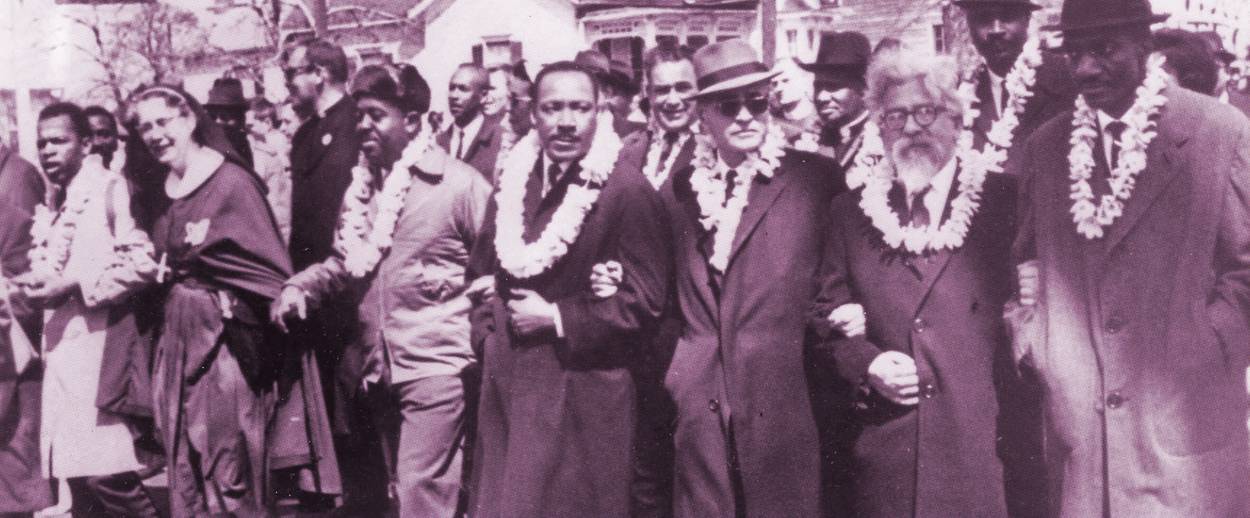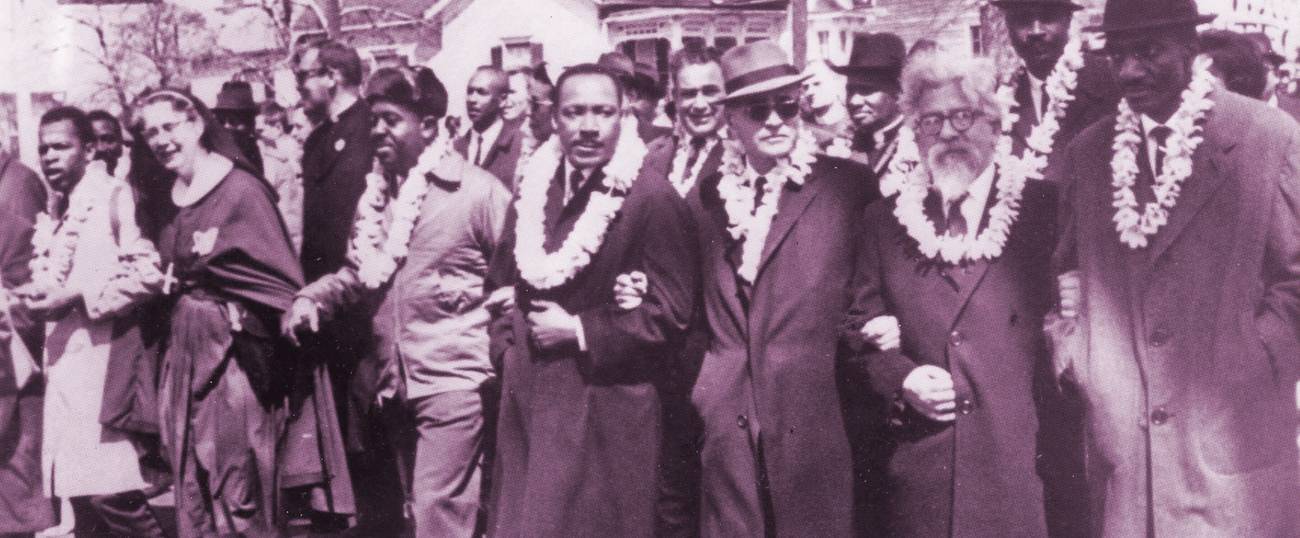King and Heschel and Moses
A documentary film draws connections between the civil rights leader, the Jewish theologian, and the prophet




By all accounts, being a prophet is no picnic. No one wants the job. Nobody decides to do it; it gets thrust on you, and you do anything you can to get out of it (see: Jonah, Moses). Most prophets recognized in our society have been men, and the agony of shouldering a burden for the sake of others at enormous personal expense sometimes seems not unlike that of our pop-culture superheroes, like Spidey, Wolverine, or Superman. But a prophet is not a superman. He’s more like a noodge, a persecuted, driven noodge.
Our Jewish tradition’s most famous prophet (one shared also by Christianity and Islam) is the subject of an exhibition at the Musee d’art et du Judaisme in Paris. The show Moses: Paintings of a Prophet (Moïse: figures d’un prophète) opened on October 14 and runs until February 21. Featured in it are two men revered by liberal Jews in America: The Rev. Martin Luther King Jr and Rabbi Abraham Joshua Heschel, whose united efforts are represented by a 15-minute excerpt from a documentary film by Steve Brand titled Abraham Joshua Heschel & Moses. The full documentary, Praying With My Legs: the Spiritual Witness of Abraham Joshua Heschel (not yet released and seeking funding to complete), traces the life and philosophy of one of the 20th century’s great Jewish theologians. It details well the close relationship he shared with King and their involvement together in the civil rights and Vietnam War protest movements, which is the portion of the film on view at the museum in Paris.
King and Heschel initially bonded over the prophets. King was drawn to Heschel’s intimate knowledge of the topic (Heschel’s masterwork, in a body of masterworks, was his book The Prophets), and Heschel in turn admired King’s devotion to the Exodus story of Moses and the Israelites, adapted to the narrative of the civil rights struggle in the 1950s and ’60s. King, like his model Moses, famously did not reach the promised land of equal rights for Black Americans, dying without seeing the vision he’d been journeying toward. (This fight has recently experienced a resurgence of energy, with the Black Lives Matter movement, among others, helmed by a set of laser-sharp but more circumspect 21st-century prophets, including men like activist DeRay McKesson and author Ta-Nehisi Coates.)
Heschel’s scholarship, as well as his close friendship with King, makes him an apposite choice for inclusion in the show, but he can also be considered a kind of prophet himself. The main job of the prophets of the Bible, after all, is to hold their people’s feet to the fire. Moses railed at the weak and foolish Israelites who strayed from the path the minute their leader ascended to the mountaintop to commune with God. King fulminated against the war in Southeast Asia as well as against the injustices rampant in white American culture toward those whom it had enslaved for hundreds of years. Heschel supported both these causes, incurring the disapproval of some Jewish leaders when he did not hesitate to vigorously excoriate U.S. involvement in Vietnam, preaching widely on the subject, writing letters to presidents, and being a spokesman for other religious leaders in meetings with high-level military strategists like Secretary of State Dean Rusk.
As one can see from the film, Heschel, like King, had the charisma a prophet needs. He was impossible to dismiss, even when his message stung. The consummate gadfly, he shined a bright light on the ills of American society and also on those of American Judaism in the mid-20th century, which he saw as stultifying, airless, soulless, moribund. He was an outlier on one crisis we face today: how to make Judaism not only appealing but actually indispensable for Jews of future generations. His words were bracing and his exhortations powerful, but, rendered in such breathtakingly poetic language (as well as expressed verbally in his disarming Polish accent), they seem like a loving gift from a benevolent elder, not a rebuke: He even warned warmly. He was a Jew who had suffered and seen too much suffering, and who, unlike the rest of us, was capable of vision on a greater scale, the prophetic scale. He knew what he was talking about, and, like King, he believed people could rise up, be their best selves, and behave with righteousness and even with holiness.
Heschel died in 1972, four years after his friend King was shot dead. It’s a long time ago now. The prophets we have today don’t speak in King’s mellifluous rhetoric or write in Heschel’s enchanting prose. Maybe we have murdered or hounded to death those with the capacity to make our hearts soar with their words of justice and compassion; we’ve gotten pretty cynical, maybe too cynical for those kinds of voices. Our prophets now will have to be more cool (though certainly not detached), more pointed, more nimble, less grand, less moving. But given the length and resilience of our Jewish tradition, it is not too much to hope that we can still hear, and respond to, the ancient message of justice coming down through the ages, rolling, as Amos said, like a mighty river.
Siân Gibby holds the position of writer/editor at the John D. Calandra Italian American Institute. She is the translator of Intimate History of the Great War, by Quinto Antonelli; The God of New York, by Luigi Fontanella; and Resistance Rap, by Francesco Carlo.